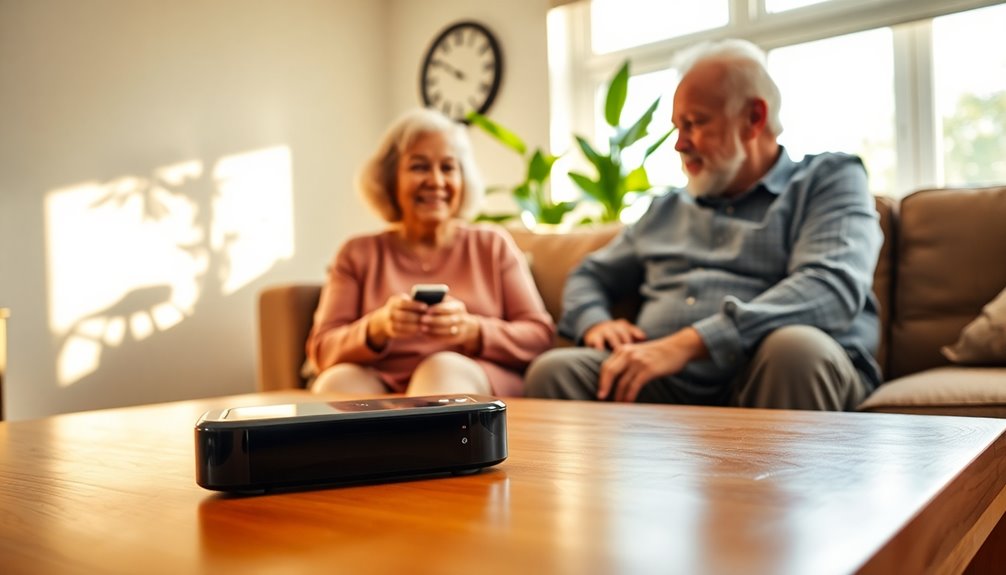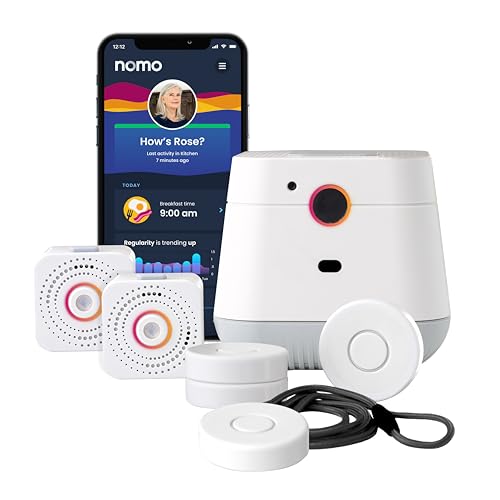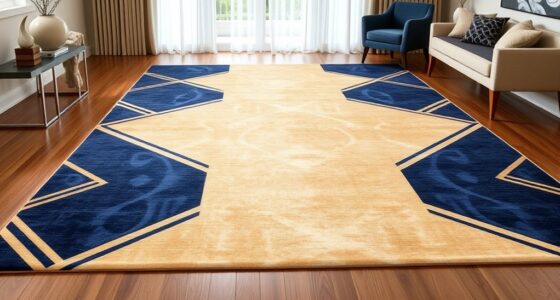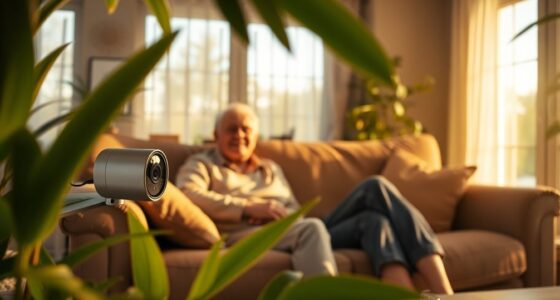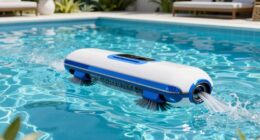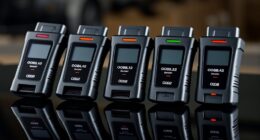If you’re looking for the best medical alert systems for the elderly in 2025, I’ve found some excellent options that offer safety and peace of mind. Systems like the SOS Micro, Medical Guardian MGMini, and Freedom Alert combine essential features such as 24/7 monitoring, GPS tracking, and user-friendly designs. They cater to various needs and budgets. Stick around, and I’ll share more details on what each system has to offer and how to choose the right one for your loved ones. These systems not only provide immediate assistance in emergencies but also come equipped with features like automatic fall detection and two-way communication, ensuring that help is always within reach. When searching for the best personal alarms for seniors, it’s essential to consider battery life, range, and ease of use, as these factors can greatly influence the effectiveness of the system. With the right tools in place, you can enhance the independence of your loved ones while ensuring their safety at all times.
Key Takeaways
- Medical alert systems enhance safety for the elderly with features like fall detection, GPS tracking, and 24/7 monitoring services.
- Popular options include SOS Micro, Medical Guardian MGMini, and Safety+ 4G, each offering unique functionalities.
- Cost-effective choices, such as Life Guardian, eliminate monthly fees while providing essential emergency features.
- User-friendly designs ensure seniors can easily operate devices, promoting confidence and independence during emergencies.
- Considerations for selection include monitoring capabilities, subscription costs, and battery reliability for optimal safety and peace of mind.
SOS Micro Medical Alert System for Seniors
The SOS Micro Medical Alert System for Seniors is an ideal choice for elderly individuals seeking peace of mind, especially because it features a lightweight design that can be worn comfortably on a wrist, neck, or belt clip. I love that it connects to a USA-based monitoring center, offering 24/7 emergency support. The panic button and location tracking guarantee help is just a press away. With a monthly fee starting at $29.95, I appreciate there are no hidden costs or long-term contracts. Plus, the battery lasts up to 36 hours, which is reassuring for daily use.
Best For: Seniors seeking a reliable and user-friendly medical alert system for emergency situations.
Pros:
- Lightweight and versatile design allows for comfortable wear on the wrist, neck, or belt clip.
- 24/7 emergency monitoring connects users to a USA-based response center for immediate assistance.
- Affordable monthly fee starting at $29.95 with no hidden costs or long-term contracts.
Cons:
- Battery life may require frequent charging, as it lasts up to 36 hours.
- Some users reported concerns about battery charging habits affecting performance.
- Optional features may incur additional costs, which could increase overall expenses.
Medical Guardian MGMini Medical Alert Necklace Systems for Seniors
For seniors seeking a reliable and lightweight medical alert system, the Medical Guardian MGMini stands out with its water-resistant design and 4G hourly location tracking. I love how it provides instant connection to a live operator with just a button press, making emergencies feel less intimidating. Plus, it tracks my steps and goals through the MyGuardian app. The battery lasts over five days, but I did face some challenges with charging and GPS accuracy. Still, the quick emergency response, especially for falls, offers peace of mind. Just be sure to test it in your usual surroundings for best results.
Best For: Seniors looking for a lightweight, water-resistant medical alert system with easy access to emergency support.
Pros:
- Instant connection to a live operator for emergencies with a single button press.
- Step tracking and goal setting features available via the MyGuardian app for health monitoring.
- Quick emergency response, particularly effective for fall detection.
Cons:
- Charging issues due to lack of an onboard charge indicator; relies solely on the charging cradle.
- GPS tracking accuracy and app performance can be inconsistent, affecting usability.
- Potential difficulties in activation and attachment mechanisms may challenge non-tech-oriented seniors.
SOS Mobile GPS Medical Alert System for Seniors
If you’re looking for a reliable solution to guarantee safety for seniors, the SOS Mobile GPS Medical Alert System stands out with its 24/7 emergency monitoring feature. Weighing in at just 9.9 ounces, it’s lightweight and can easily be worn on a lanyard or belt clip. The panic button connects you to live operators, ensuring help is always just a press away. Plus, its 4G LTE connectivity means you’re covered nationwide. I appreciate the caregiver tracking feature too, allowing loved ones to monitor my location. With a subscription starting at $29.95, it’s a small price for peace of mind.
Best For: Seniors seeking a reliable and easy-to-use medical alert system for emergency situations.
Pros:
- 24/7 emergency monitoring ensures help is always available.
- Compact and lightweight design makes it easy to wear or carry.
- Caregiver tracking feature allows loved ones to monitor location and activity.
Cons:
- Battery life may be a concern for some users.
- Additional cost for fall detection feature may deter some customers.
- Customer service experiences can be inconsistent, leading to potential frustration.
SOS Micro Medical Alert System for Seniors
Designed specifically for seniors, the SOS Micro Medical Alert System offers an essential lifeline in emergencies with its 24/7 monitoring and optional fall detection features. Weighing less than 1.2 ounces, it’s lightweight and water-resistant, making it easy to wear on your wrist, neck, or clipped to your belt. With a monthly fee starting at $29.95, you get reliable USA-based emergency monitoring. Plus, caregivers can track your location and battery life through a free app. Users love the clear communication with operators, although some mention the battery life could be improved. Overall, it’s a dependable choice for peace of mind.
Best For: Seniors seeking a reliable medical alert system for emergency situations with 24/7 monitoring and caregiver support.
Pros:
- Lightweight and versatile: At less than 1.2 ounces, it can be comfortably worn in various ways.
- 24/7 emergency monitoring: Users receive continuous support from USA-based dispatch centers.
- Caregiver tracking capabilities: Caregivers can easily monitor location and battery status through a free app.
Cons:
- Battery life concerns: Some users report that the battery life may need improvement.
- Additional costs for features: Optional services may incur extra charges beyond the monthly fee.
- Limited user ratings: Only two ratings available, which may not represent a broader user experience.
CallToU Caregiver Pager Wireless Call Button Alert System
The CallToU Caregiver Pager Wireless Call Button Alert System stands out as an excellent choice for elderly individuals or those with mobility challenges who need immediate access to assistance. With a range of over 500 feet, this system allows users to call for help from anywhere in the home. I love that the waterproof transmitter is portable and can be worn as a pendant, making it easy to access. Plus, with 55 ringtones and a loud 110 dB alert, I can guarantee caregivers hear me clearly. This reliable system truly offers peace of mind for anyone needing support in their daily life.
Best For: The CallToU Caregiver Pager Wireless Call Button Alert System is best for elderly individuals, seniors, patients, and disabled individuals who require easy access to assistance while maintaining their independence.
Pros:
- Long Range: Operates effectively over a distance of 500+ feet, allowing users to call for help from various rooms.
- User-Friendly: Simple setup and operation, making it accessible for individuals with limited technical skills.
- Customizable Alerts: Offers 55 ringtones and adjustable volume levels, catering to personal preferences and ensuring alerts are heard.
Cons:
- Battery Dependency: Requires a AAA battery for the transmitter, which may need regular replacement.
- Limited Range in Large Homes: While effective, the range may be reduced in very large or multi-story homes with thick walls.
- May Be Overly Loud: The 110 dB alert may be too loud for some environments, potentially being disruptive in quiet settings.
Safety+ 4G Medical Alert System with Fall Detection and GPS
For anyone looking to enhance the safety of elderly family members, the Safety+ 4G Medical Alert System stands out with its fall detection feature. With 24/7 nationwide monitoring, this lightweight device provides peace of mind. It includes GPS location tracking and a mobile caregiver app, making it easy to stay connected. The system’s water-resistant design guarantees durability, and the battery lasts up to six days. Plus, the first month is free, with a straightforward $40 monthly subscription after that. Users rave about its responsiveness, but some have reported mixed experiences with customer service. Overall, it’s a solid choice for safety.
Best For: Individuals seeking a reliable medical alert system for elderly family members that offers fall detection and GPS tracking for enhanced safety.
Pros:
- 24/7 nationwide emergency monitoring provides peace of mind.
- Lightweight and water-resistant design ensures durability and comfort for daily wear.
- Free caregiver app allows for real-time tracking and communication with family members.
Cons:
- Mixed reviews on customer service responsiveness and app functionality.
- Some users have reported concerns regarding billing transparency and potential hidden fees.
- Monthly subscription of $40 may be a consideration for budget-conscious consumers.
Freedom Alert Max Cellphone with Medical Alert System for Seniors
Seniors seeking a dependable way to stay connected and safe will find the Freedom Alert Max Cellphone with Medical Alert System particularly appealing. This device combines a cellphone with a robust medical alert system, ensuring help is just a call away. With patented fall detection technology, it automatically reaches emergency services if you fall. The GPS tracking provides real-time location data, and geofencing alerts caregivers if you wander outside set boundaries. Plus, its easy-to-use design and positive feedback from users highlight its effectiveness. The subscription fee feels reasonable for the peace of mind and support it offers.
Best For: Seniors and elderly individuals who need a reliable way to stay connected and safe with immediate access to emergency services.
Pros:
- Patented fall detection technology automatically calls for help if a fall is detected.
- GPS tracking provides real-time location information, enhancing emergency response times.
- User-friendly design makes it easy for seniors to use and communicate during critical moments.
Cons:
- Monthly subscription fee may be a deterrent for some customers seeking a one-time purchase.
- Limited features compared to more advanced smartphones, which may not appeal to tech-savvy users.
- Dependency on service coverage, as effectiveness may vary based on the user’s location and network availability.
Life Guardian Medical Alarm Emergency Alert Phone System
If you’re looking for a medical alert system that offers peace of mind without the burden of monthly fees, the Life Guardian Medical Alarm Emergency Alert Phone System stands out as an ideal choice for elderly individuals. This system plugs into your landline and includes two panic buttons—one for your wrist and one as a necklace. It can call up to three numbers, including 911 if you choose. I appreciate the two-way communication feature and the convenience of being pacemaker safe. Just remember to practice using it, as familiarity can boost your confidence during emergencies.
Best For: Those seeking a reliable medical alert system for elderly individuals without the hassle of monthly fees.
Pros:
- No monthly fees, bills, or contracts required, making it a cost-effective option.
- Two panic buttons (wrist and necklace) are water-resistant and easy to use.
- Two-way communication feature provides direct contact with emergency contacts.
Cons:
- May have limitations on outgoing message length, which could affect clarity.
- Not designed to work with cell phones unless an optional adapter is used.
- Some users report concerns about the wrist panic button’s design and the quality of the message recording.
CallToU Wireless Caregiver Pager Call Button Medical Alert System for Seniors
The CallToU Wireless Caregiver Pager Call Button Medical Alert System stands out as an ideal choice for elderly individuals seeking a reliable way to maintain communication with caregivers. With its two waterproof transmitters and three plugin receivers, I can easily call for help from anywhere in my home, even from over 500 feet away. The system features 55 ringtones and adjustable volume levels, ensuring I’ll never miss an alert. Plus, its easy setup requires no subscriptions or Wi-Fi. With a strong customer rating of 4.6 stars, it’s clear that this system enhances safety and peace of mind for seniors like me.
Best For: Seniors, elderly individuals, and disabled persons seeking an easy and reliable way to communicate with caregivers at home.
Pros:
- Easy to set up with no subscriptions or Wi-Fi required.
- Waterproof and dustproof design makes it suitable for use in bathrooms and outdoor areas.
- Loud alerts with adjustable volume and a variety of ringtones ensure that alerts are easily heard.
Cons:
- Limited range may not be suitable for very large properties.
- Requires electrical outlets for receivers, which may limit placement options.
- Some users may find the variety of ringtones overwhelming or unnecessary.
FullHouse Wireless Caregiver Pager System
Designed for elderly or disabled individuals seeking independence at home, the FullHouse Wireless Caregiver Pager System stands out with its impressive range of up to 1000 feet in open air. This SOS alert system allows me to call for help without shouting, which is perfect for privacy. With its waterproof rating of IP55, I don’t have to worry about splashes, although I should remove it before bathing. I love the 52 ringtone options, and the volume adjusts from 0dB to 110dB. It’s easy to install, and the simple design makes it user-friendly, even for those with arthritis.
Best For: Elderly or disabled individuals seeking an easy-to-use communication system for help at home.
Pros:
- User-friendly design suitable for individuals with arthritis.
- Impressive range of up to 1000 feet in open air, allowing for effective communication throughout the home.
- Customizable alerts with 52 ringtone options and multiple volume levels, including silent mode.
Cons:
- Waterproof rating of IP55 means it should be removed before bathing, limiting its use in wet environments.
- Battery-operated requiring 2 Lithium Ion batteries, which may need replacement over time.
- Limited effectiveness in very large homes with numerous walls, potentially reducing range to 500 feet.
Elderly Senior Medical Alert System (No Monthly Fees)
For seniors seeking peace of mind without the burden of monthly fees, the Elderly Senior Medical Alert System stands out as an ideal choice. This system connects you directly to emergency contacts or 911 with just a button press. It’s easy to set up—just plug it in—and you can use it with your landline or an optional cell phone adapter. The portable design lets you wear panic buttons as a wristband or pendant, ensuring help is always within reach. With no recurring costs, this system promotes independence while providing the safety we all deserve.
Best For: Seniors or individuals living alone who want a reliable emergency alert system without ongoing costs.
Pros:
- No monthly fees or subscriptions, making it a cost-effective solution.
- Easy to set up with a simple plug-and-play installation.
- Portable panic buttons can be worn as a wristband or pendant, ensuring accessibility.
Cons:
- Limited to landline or optional cell phone adapter connectivity.
- Requires a power source; may not function during power outages unless connected to a backup.
- Best suited for users within 150 feet of the base unit for remote activation.
Remote Home Medical Alert System for Seniors
When it comes to ensuring safety and peace of mind for seniors living independently, the Nomo Smart Care Essential Care Kit stands out with its advanced fall detection feature. This remote home medical alert system is a game changer. With a user-friendly mobile app, you can customize alerts, track activity, and invite family members for support. The setup is quick—just plug in the hub and satellites, and you’re ready to go! I appreciate the 24/7 monitoring, allowing for seamless communication during emergencies. It truly offers reassurance to both seniors and their loved ones, making it an essential addition to home safety.
Best For: Seniors living independently who need reliable monitoring and emergency response support.
Pros:
- Advanced fall detection ensures immediate alerts in case of emergencies.
- User-friendly mobile app allows for customizable alerts and activity tracking.
- 24/7 monitoring service provides peace of mind for both seniors and their families.
Cons:
- Subscription required for full functionality, which may incur additional costs.
- Dependent on WiFi connectivity, which could be an issue in areas with poor internet service.
- Limited portability due to being a corded device, making it less flexible for travel.
Emergency Communicator Pendant Medical Alert
An ideal choice for anyone seeking peace of mind, the 911 Help Now Location Plus Emergency Communicator Pendant offers a simple yet effective solution for immediate assistance. It’s compact, weighing just 4.2 ounces, and comes with no monthly fees. With a single button press, I can connect directly to 911, and the built-in GPS tracks my location. The two-way voice communication lets me speak directly with responders, ensuring help arrives quickly. Plus, it’s splash resistant and includes a neck strap for convenience. While some users report connectivity issues in rural areas, I find it reliable for my needs.
Best For: Individuals of all ages seeking a reliable emergency communication device without ongoing fees.
Pros:
- No monthly fees for activation or subscriptions, making it cost-effective.
- Direct connection to 911 with a single button press for quick access to emergency services.
- Built-in GPS tracking provides location information to responders, enhancing response accuracy.
Cons:
- Some users report connectivity issues in rural areas, which may affect reliability.
- Average customer rating of 3.7 out of 5 stars indicates mixed feedback on performance.
- Battery replacement needed every year, which could be a minor inconvenience for some users.
Freedom Alert Landline Personal Emergency Device
The Freedom Alert Landline Personal Emergency Device stands out as an ideal choice for seniors who prioritize direct communication in emergencies. With its two-way voice communication pendant, I can easily talk to family or emergency services without relying on a base unit. Installation is straightforward, and I can program it to call loved ones before dialing 911. The rechargeable battery lasts about 30 days, ensuring I’m covered. Many users, including myself, feel a sense of security knowing help is just a button away, especially for those of us living alone. It’s a reliable option that truly enhances peace of mind.
Best For: Seniors and elderly individuals seeking a reliable and easy-to-use personal emergency communication device.
Pros:
- Allows direct two-way communication with family or emergency services without relying on a base unit.
- Easy installation and programming, with the ability to set a call sequence for emergencies.
- Lightweight and portable design provides peace of mind for users, especially those living alone.
Cons:
- Some users report battery-related issues that can lead to accidental 911 calls.
- Occasional glitches such as conference call-like issues during operation.
- Regular battery maintenance and periodic replacement may be necessary after about a year of use.
Medical Guardian MGMini Medical Alert Necklace System for Seniors
Designed specifically for seniors, the Medical Guardian MGMini Medical Alert Necklace System stands out due to its lightweight, water-resistant design and 4G location tracking. I appreciate how easy it is to connect with a live operator by simply pressing a button in emergencies. The included MyGuardian app tracks my steps and helps me set goals. However, I’ve noticed some challenges, like no onboard charge indicator and occasional GPS inaccuracies. Overall, this device offers quick emergency response, but I recommend testing it in your usual environments to ascertain it works effectively where you need it most.
Best For: Seniors who need a reliable and easy-to-use medical alert system with emergency response capabilities.
Pros:
- Instant connection to a live U.S.-based operator for emergencies.
- Lightweight and water-resistant design makes it comfortable for daily wear.
- Includes step tracking and goal setting through the MyGuardian app to promote active living.
Cons:
- No onboard charge indicator, relying solely on the charging cradle for monitoring battery life.
- Occasional GPS inaccuracies may affect location tracking effectiveness.
- Some users have reported difficulties with device activation and app performance.
Factors to Consider When Choosing Medical Alert Systems for Elderly
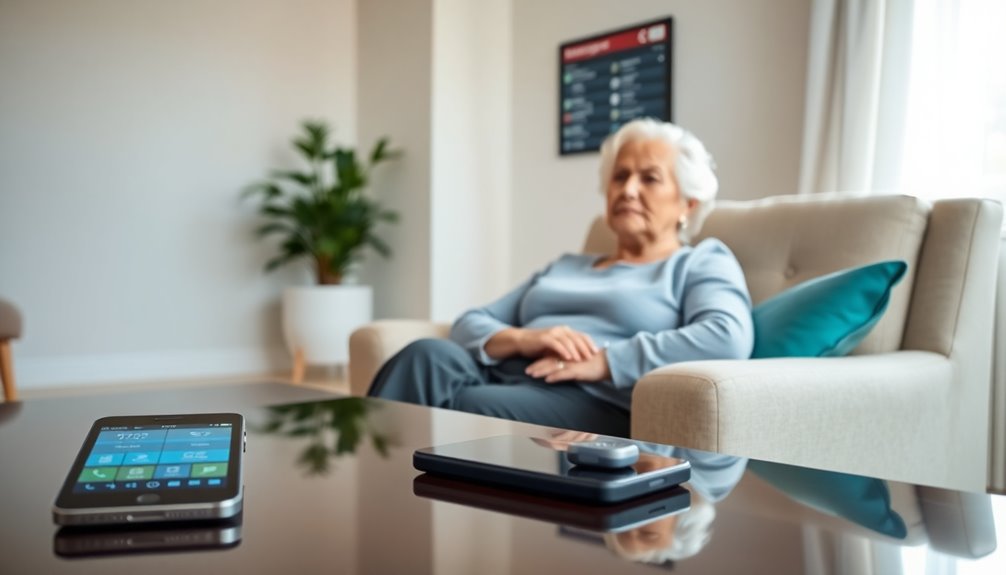
When choosing a medical alert system for the elderly, I’ve found it essential to take into account several key factors. The monitoring features, device comfort, and ease of activation can make a big difference in daily use. Plus, understanding connectivity options and subscription costs helps guarantee you pick the right system for your needs.
Monitoring Features and Services
Choosing a medical alert system for the elderly involves careful consideration of its monitoring features and services. I prioritize systems that offer 24/7 emergency response, allowing immediate access to live operators whenever needed. Location tracking is also essential; it lets caregivers keep tabs on the user’s whereabouts via a mobile app or web portal. I appreciate optional fall detection services that automatically alert emergency responders if a fall occurs, ensuring help arrives even if the user can’t press a button. Additionally, user-friendly communication features, like two-way voice, enable direct conversation with emergency responders for tailored assistance. Subscription models typically start around $29.95 a month, often with free trials, so I can evaluate the system before committing.
Device Design and Comfort
While selecting a medical alert system, I find that device design and comfort are essential factors to take into account. The weight of the device plays a huge role; systems under 2 ounces are much easier to wear all day. I also appreciate water-resistant designs, like those with IP-67 or IP55 ratings, so I can use them in the shower or during activities without worry. Ergonomic designs are a must—whether it’s a bracelet, necklace, or belt clip, the device shouldn’t cause irritation. Battery life is another consideration; systems that last up to 6 days on a single charge offer added convenience. Finally, options like lanyards and wristbands provide personalization, ensuring the device feels right for me.
Activation Process and Ease
Activating a medical alert system can be a straightforward process, but it’s crucial to select one that suits your needs. Some systems require a phone call for activation, while others let you set everything up online, often with a free trial period. I recommend looking for systems that emphasize immediate activation upon receipt, ensuring you’re ready for emergencies right away. It’s also helpful if the activation process is intuitive, especially for seniors or caregivers who might find technology challenging. Clear instructions and support during this phase can really boost confidence. Remember, the quicker you can activate the system, the better your safety will be in urgent situations. Choose wisely, and you’ll have peace of mind when it matters most.
Connectivity and Coverage
When it comes to selecting a medical alert system, connectivity and coverage are vital factors that can greatly impact your safety. I’ve found that most systems rely on cellular networks, with 4G LTE being the standard for reliable nationwide coverage. This is essential, especially in remote areas. Some systems even offer dual connectivity options, using both cellular and WiFi, which can enhance reliability in areas with weak signals. The effective range can vary, with some devices reaching over 500 feet in open spaces, but walls can reduce this distance. Always check compatibility with existing communication infrastructures, like landlines. Finally, environmental factors such as buildings or trees can obstruct signals, so testing the device in your typical surroundings is vital.
Subscription Costs and Policies
Maneuvering the subscription costs and policies of medical alert systems can feel overwhelming, but understanding these factors is vital for making an informed choice. Typically, monthly fees range from $29.95 to $40, covering 24/7 emergency monitoring and support. Many providers offer a free initial month, allowing you to evaluate the service without commitment. Be mindful of optional features like fall detection, which can add $9.99 to $15 monthly. It’s important to check for hidden fees or long-term contracts, as flexible cancellation policies can save you from penalties. Ultimately, consider the overall cost-effectiveness based on the monitoring level, included features, and your specific needs to guarantee you choose the right system.
Emergency Response Capabilities**
Choosing the right medical alert system hinges on understanding its emergency response capabilities. I always recommend looking for systems that provide 24/7 emergency monitoring, ensuring help is available whenever needed. Two-way communication is imperative; it lets users talk directly with emergency operators, which can be significant in critical situations. GPS location tracking is another feature to examine, as it helps responders find users quickly, especially outdoors or in unfamiliar areas. Fall detection is essential too, automatically alerting services if someone falls, adding an extra layer of safety. Finally, evaluate the response times of monitoring centers; quicker responses can make all the difference in emergencies. Prioritize these capabilities for peace of mind and safety.
Frequently Asked Questions
What Is the Average Cost of Medical Alert Systems for Seniors?
I’ve found that the average cost of medical alert systems for seniors typically ranges from $20 to $50 per month. Some companies even offer one-time purchase options, which can be around $100 to $300. It really depends on the features you need, like GPS tracking or fall detection. I recommend comparing different providers to find the best fit for your budget and safety needs. It’s worth investing in peace of mind!
Do Medical Alert Systems Work Outside the Home?
Yes, medical alert systems do work outside the home! I’ve discovered that many modern systems come with GPS tracking and cellular connectivity, allowing you to stay connected wherever you are. Whether I’m at the park or running errands, I can easily reach help if needed. It’s reassuring to know I’m protected beyond my front door. Just make sure to choose a service that offers reliable coverage in the areas you frequent.
Can I Use My Smartphone With a Medical Alert System?
Absolutely, you can use your smartphone with many medical alert systems! I’ve found that some systems offer apps that connect directly to your phone, allowing you to receive alerts and notifications wherever you are. It’s really convenient! Plus, if you ever need assistance, you can often call for help right from your smartphone. Just make sure to check if the system you choose has this feature; it’s a game-changer for peace of mind!
What Happens if the Battery Dies on My Medical Alert Device?
Imagine I’m at home, feeling secure, when suddenly my medical alert device stops working because the battery dies. If that happens, I won’t be able to call for help in an emergency. Most devices alert me when the battery is low, but it’s essential to check regularly. I always keep a spare battery handy. It’s all about staying prepared, so I can maintain my safety and peace of mind.
Are There Any Hidden Fees With Medical Alert Systems?
I’ve looked into medical alert systems, and yes, some do have hidden fees. It’s crucial to read the fine print. I’ve found that companies might charge for equipment, installation, or monthly service that they don’t disclose upfront. I always recommend asking about any extra costs or cancellation fees before signing up. Being informed can save you money and stress in the long run, so don’t hesitate to clarify anything unclear!
Conclusion
In a world where safety is paramount, choosing the right medical alert system can feel like finding a needle in a haystack. But just like Gandalf guiding Frodo, the right system can lead you to peace of mind. Remember, it’s not just about a device; it’s about the assurance that help is always within reach. So, whether you’re exploring SOS options or Medical Guardian, trust your instincts and prioritize your safety. You deserve to feel secure in your golden years!
